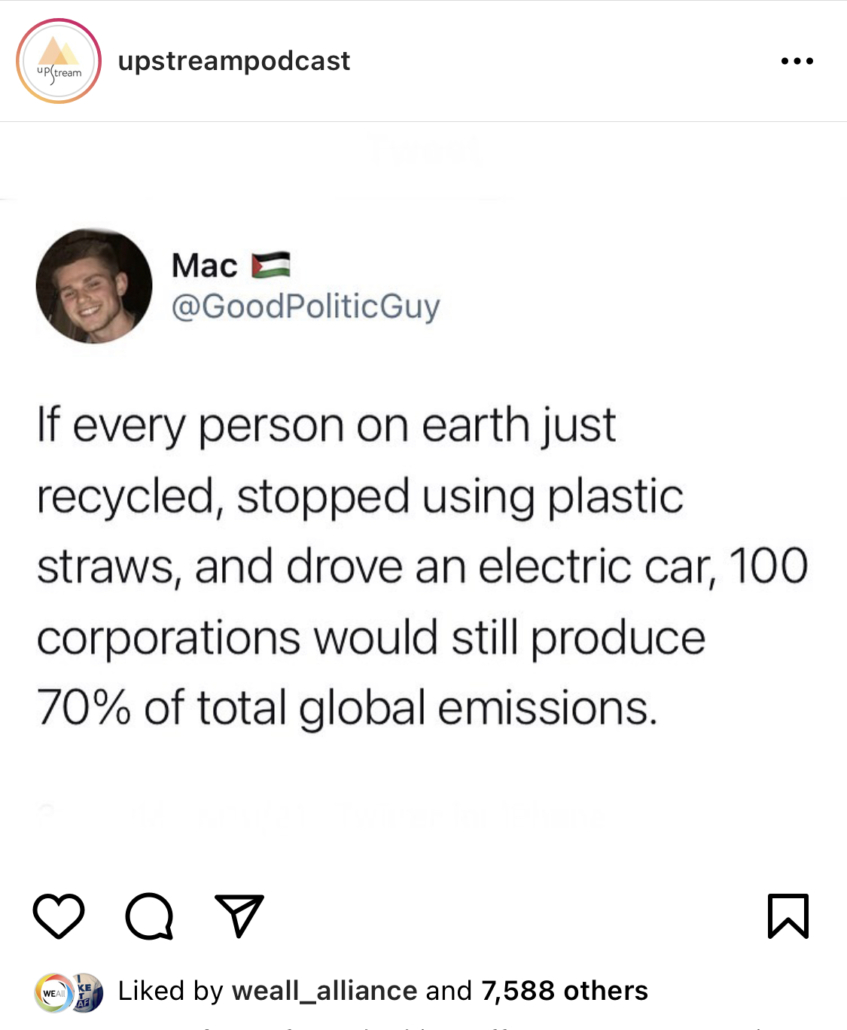Written by: Isabel Nuesse
This week the Intergovernmental Panel on Climate Change (IPCC) released a new report titled: “Climate Change 2021: The Physical Science Basis”. Quick recap? Our planet is in a ‘code red’ situation and if we don’t act quickly, human survival on earth is questionable.
It states: “Global surface temperature will continue to increase until at least the mid-century under all emissions scenarios considered. Global warming of 1.5°C and 2°C will be exceeded during the 21st century unless deep reductions in carbon dioxide (CO2) and other greenhouse gas emissions occur in the coming decades.”
So, we need to act now.
It’s entirely overwhelming. What does doing more look like?
First and foremost, we cannot continue to live in an economic system where GDP growth remains the only goal of our economic system.
What does that mean for governments? That means actively working with their citizens to re-identify the purpose of the economic system. If our purpose is to promote better lives for people, we need to develop real objectives such as improving quality of life, reducing inequality, generating meaningful jobs and restoring our natural environment. We need to create policies that reflect the needs of the people. Check out our Policy Design Guide to learn how to begin this process.
What does that mean for business? It means creating ownership structures where employees are prioritised ahead of shareholders. No longer can we create businesses that are focused on short-term, profit-focused objectives. In a Wellbeing Economy, finance would serve and incentivise the economy which then serves society – and the environment- as part of its intrinsic purpose. Learn more in our Wellbeing Business Guide for how your business can begin to make these changes.
Second, we cannot continue to blame the consumer for the problems of global industry.
Are we going to hold mulit-national corporations (MNCs) responsible for their impact on our environment? In our 7 Ideas for the G7 paper, we suggest two things to harness control of the MNC’s that have grown to levels that are politically sustainable and ethically unacceptable.
- Create a Binding Code of Conduct for MNCs that can create space for upholding democratig governance of economics, but also ensure more ethical production practices worldwide.
- Global Competition Regulation which would ensure that no single corporation could control more than a small percentage of global production and exchange.
Lastly, we need to be sharing success stories of what is working in our world to ensure that we’re inspiring each other to continue to push for drastic change to our economic system.
As the Stories for LIfe tells us, it’s time to drop the horror stories and carry the #lovestories
This emphasises the importance of hope over fear – in a week where the IPCC report is generating necessary fear, I find hope in the fact that so many amazing organisations and people are already doing the work to build a Wellbeing Economy. If you haven’t seen our member list, check it out here. And if you’re interested in joining our membership you can apply here.
- A few #lovestories that I’d like to share with you today, to spread some of that hope, are: End Overshoot Day just launched this incredible initiative that offers over 100 days solutions that share how we can use existing technology to displace business as usual practices we can no longer afford.
- Pure Element 5 has been creating a number of incredibly creative Youtube videos that offer small insights, lessons and trends for anyone interested in building brighter futures.
- Common Future is launching a $800,000 character-based lending fund (CBL) that was designed from the ground up, by and for underfunded BIPOC businesses and ecosystems.
- The European Environmental Bureau wrote a whole report on building a Wellbeing Economy “Towards a Wellbeing Economy that serves people and nature”
The IPCC report is right: our situation is desperate and it is urgent that we act. There is hope. The action has begun – it needs to be scaled up. It will require each of us to do what we can and to continue to feel like the future is bright. If you’re looking to get involved, join our WEAll Citizens platform, become a WEAll Member, or consider developing a WEAll Hub in your community. We’re here to support the transition to a Wellbeing Economy.
the discussion?
Let us know what
you would like
to write about!

